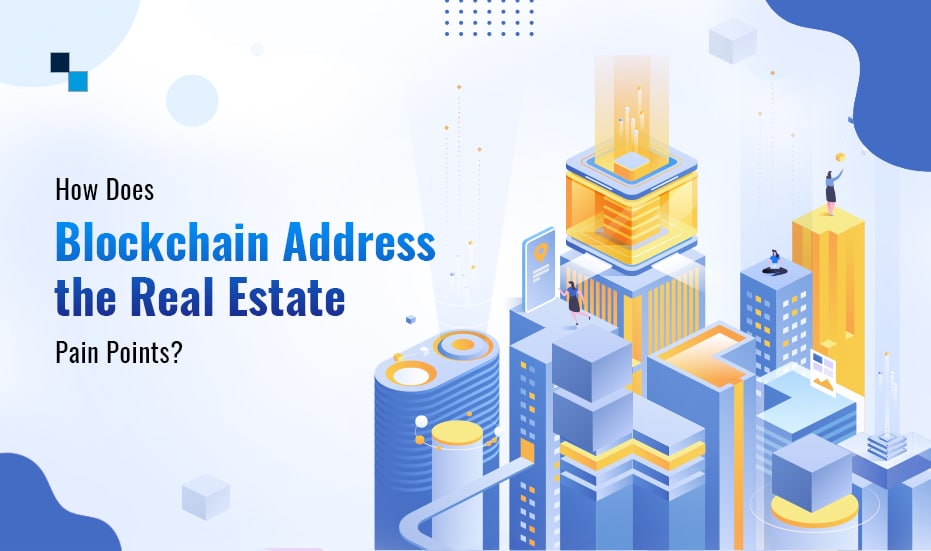Blockchain has the potential to revamp every business vertical. Whether it is banking, healthcare, or real estate, each sector of the economy is experiencing a drastic positive change in several ways. The way Blockchain is making a real impact on several sectors, there is nothing wrong with saying that the role of this technology is beyond cryptocurrencies.
Talking specifically about real estate, the sector is leveraging this new-age technology to enjoy several perks, such as transparency, security, etc. Although real estate is a slow-mover when it comes to Blockchain adoption, the impact of the technology on this sector is impeccable. If you’re planning to dip your toes in Blockchain real estate software development, you must understand how Blockchain has helped this sector to grow and address numerous challenges.
Major Challenges Faced in Real Estate
Challenge 1: Poor Transaction Speed
A survey conducted by OneDome has revealed that the lower transaction speed is one of the major issues faced in the sector. The reason behind this problem is the involvement of numerous people in the process. Not only this, but the higher dependency on paper-based processes also slows down the transactions that further affect the overall experience of parties involved.
Solution: Blockchain technology is popular for its incredible features. The technology addresses the poor transaction speed problem using smart contracts. This computer protocol can automate paper-based processes and make the whole process of buying and selling property painless. Smart contracts automate processes like transfer of ownership, fulfillment of legal requirements, or disbursement of funds. Automation will speed up the transactions and, at the same time, reduce the cost of buying and selling property.
Challenge 2 : No Transparency
The inability of providing a transparent environment to the parties involved, such as realtors, buyers, and real estate agents is another major shortcoming in the real estate sector. The lack of transparency makes it difficult for buyers and sellers to make informed decisions and leads them to pay unjustified additional costs that increase the overall process costs.
Solution: Blockchain eliminates the opacity factor in the real estate ecosystem. Although the real estate industry is complex, Blockchain for real estate development makes it transparent to help parties gain more clarity about current events and access information about a property’s history, including past ownership, & property taxes. The decentralized nature of Blockchain allows the information to be easily accessed as it is shared among all parties in the network. Even the data cannot be altered as the technology also offers the advantage of immutability. It avoids inefficiencies in the system and helps parties to avoid paying unjustified additional costs such as transactions and convenience fees.

Challenge 3: Limited Liquidity
One of the major shortcomings of the real estate market is that it is often illiquid. It means buying and selling a property takes a long time, making it difficult for buyers and sellers to get possession of their new property and further invest in the market.
Solution: One can take advantage of the Blockchain to create tokens that represent ownership of a specific property, which can be further bought and sold on a blockchain-based platform. It creates liquidity in the real estate market, making it convenient for people to invest in the property even if they don’t have cash.
Challenge 4: A lot of Intermediaries
The real estate market has long been witnessing the presence of brokers, lawyers, banks, or real estate agents that charge a specific amount or fees, resulting in expensive investments. These intermediaries often use the term good faith estimate, but it doesn’t happen in all cases. In scasome instances, they change the estimates and could end up paying a higher rate or additional fees.
Solution: According to a report by Deloitte, Blockchain may soon eliminate the role and participation of intermediaries in real estate transactions. The technology cuts out intermediaries that help save more on commissions and fees charged by them. In addition, it also makes the process faster as there are no middlemen.
Challenge 5: Inefficient Processes
As discussed earlier, real estate still relies on paper-based processes that result in inefficiencies and at the same time, slow down the transactions. Besides, sharing information is difficult for the parties involved. The paper-based processes are also prone to several errors. Such inefficiencies in real estate can frustrate buyers and sellers.
Solution: Blockchain for real estate development promotes efficient record keeping. The real estate sector can build digital entities for all the paperwork and keep it on a decentralized ledger. Blockchain provides easy access to information to everyone in the network. The distributed nature of the Blockchain doesn’t allow even the admin to alter or delete the information stored, making it safe and secure.
Conclusion
Real estate is taking a foot forward by revamping its traditional processes by integrating the Blockchain. The technology has made transactions easier and more transparent. With Blockchain real estate software development, industry leaders can survive in the highly competitive market and address the challenges in the sector. Although we have clearly highlighted how Blockchain can help tackle several real estate challenges if you want to learn more, connect with Antier today!
Antier is a Blockchain real estate software development company that helps industries in real estate undergo a radical transformation. With our assistance, enterprises can make the processes more secure, efficient, and transparent. Our proficiency in Blockchain for real estate development can bring a revolutionary change to the old real estate processes.
‘





